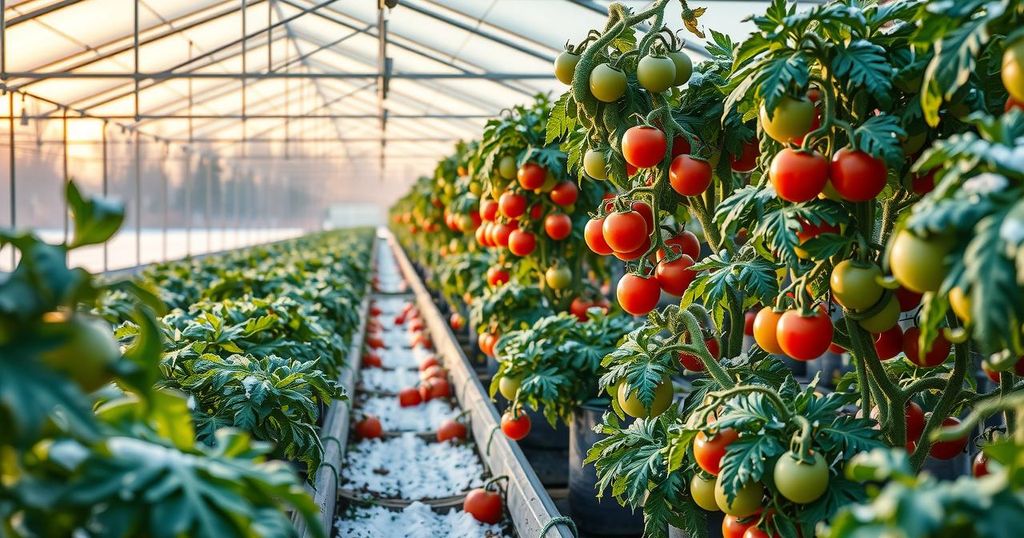The Shakh Eco Food greenhouse utilizes advanced technology to cultivate tomatoes in Kazakhstan’s severe winter climate, ensuring optimal growth conditions while embracing sustainability. Founders Elikram Mustafazade and Agasahib Gasimov focus on smart energy management, effective irrigation systems, and biological pest control to achieve high-quality crops. The success of this greenhouse signifies a key advancement in agriculture in challenging environments.
The Shakh Eco Food greenhouse in Kazakhstan exemplifies innovative agricultural practices that allow for the growth of tomatoes during the harsh winter months. Inside this 14-hectare facility, the temperature remains consistently warm, providing a stark contrast to the freezing conditions outside. The founders, including Elikram Mustafazade and Agasahib Gasimov, alongside consultant Dr. Rasim Mammadov, share insights into their successful methods for cultivating crops in a challenging climate.
Kazakhstan, one of the largest countries in the world, features extreme weather patterns that complicate traditional farming methods. While summer temperatures can reach +40°C, winter can bring chilling lows of -40°C. Despite these difficulties, Kazakhstan possesses ample agricultural potential, primarily in grain production and livestock farming, and now modern greenhouse technology.
The Shakh Eco Food greenhouse employs advanced technology to sustain an ideal growing environment at 20-25°C year-round. This is achieved through smart energy management and effective insulation, utilizing double-layer polycarbonate walls to trap heat while preventing cold air intrusion. Additionally, energy curtains are deployed at night to conserve heat, accompanied by localized heating sources using sustainable energy options such as gas and biomass.
Irrigation in cold climates poses a significant challenge, particularly in maintaining warm water to support plant growth. To address this, hot water pipes run beneath the plant beds to ensure roots remain at optimal temperatures, facilitated by a boiler system that utilizes green energy sources. Continuous monitoring of water temperature guarantees that the plants receive proper hydration throughout their growth cycle.
Contrary to common assumptions, cold weather does not entirely eliminate the risk of plant diseases, especially in a humid greenhouse setting. To mitigate these risks, ventilation systems are crucial for promoting air circulation and reducing fungal growth. Furthermore, natural pest management is employed, utilizing beneficial insects instead of chemical pesticides.
The Fujimaro tomatoes cultivated at this facility are destined for Russian markets, necessitating rigorous quality control throughout the process. Grown in cocopeat substrates, the plants benefit from efficient irrigation practices, enabling precise nutrient delivery and reducing environmental impact. The use of ventilated packing and temperature-controlled transportation methods ensures quality is maintained until they reach consumers.
The advancements made at Shakh Eco Food signify significant progress in agricultural practices, turning what was once considered impossible into a thriving reality. According to Dr. Mammadov, “Growing tomatoes in Kazakhstan’s harsh winter was once a dream. But now, it is a reality—thanks to modern greenhouse technology, intelligent heating systems, and scientific expertise.” This innovation showcases the future of agriculture in extreme conditions, paving the way for similar successes elsewhere, potentially even on Mars in the future.
The achievements of the Shakh Eco Food greenhouse illustrate the potential for successful agriculture in extreme climates, such as those found in Kazakhstan. By implementing advanced technologies and sustainable practices, it is now feasible to grow tomatoes during winter months. The combination of intelligent energy management, precise irrigation, and effective pest control not only enhances productivity but also contributes to environmental sustainability, marking a significant milestone in agricultural innovation.
Original Source: www.hortidaily.com






